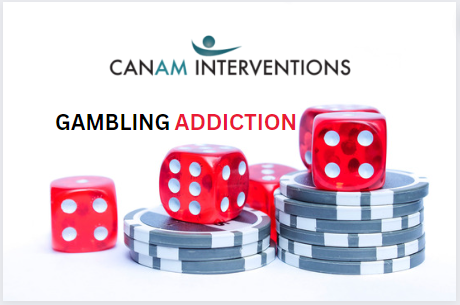For many people, gambling can be a pleasant, controlled activity that they can casually take part in. However, other individuals need to be careful, as gambling as a leisure activity can quickly develop into a compulsive disorder.The difference between these two types of people has nothing to do with mental strength – there can be many different factors as to why someone may develop a gambling disorder.
An individual with a gambling addiction experiences similar effects in the brain as someone who has an alcohol or drug addiction, and the effects of gambling can be just as devastating as alcohol or drugs. Here are some signs to look for:

1. Obsession – Unable to Stop Gambling
It appears that your loved one is constantly talking about gambling. They constantly relive past gambling experiences, especially big wins. Every time you turn around, they are on their laptop or cell phone placing bets or playing games. And no matter how many times they say they will quit, they just can’t seem to do it.Unfortunately, with technological advancements, it has become all too easy to gamble. Gambling websites and apps that withdraw money directly from a bank account pose serious issues for people. That instant and constant access can make it incredibly difficult to quit.
2. Hiding or Lying about Gambling
If someone has a gambling problem, they will likely attempt to conceal their gambling by hiding receipts or bank statements. They may lie about where they are going to avoid being questioned or accused of gambling.It’ s important for the gambler to learn that it is wrong to hide such things from their loved ones and realize that their gambling is not only affecting their own life, but the lives of those around them.
3. Gambling Despite Consequences
Despite mounting financial woes or legal consequences, they cannot stop the urge to continue gambling. They may still believe that gambling can solve their financial problems, and will continue to gamble money away with the belief that a “big win” is right around the corner. Unfortunately, it will take more than a significant loss for someone to quit gambling, since problem gamblers still get a high from gambling, regardless whether or not they win or lose.
4. Experiencing Withdrawal Symptoms When Not Gambling
Emotional withdrawal symptoms can occur when an individual with a gambling addiction stops gambling, even for 24 hours. These symptoms may include:
- irritability
- depression
- anxiety
- restlessness
- decreased sleep &appetite
- change in sex drive
When experiencing withdrawal, gamblers think that they need to gamble in order to feel normal or happy again.
5. Dysfunction in Their Daily Lives
A person with a gambling disorder may experience trouble at work, have a difficult time maintaining relationships, and may even give up their favorite hobbies and activities in order to spend time gambling. Having serious financial problems is another indicator of a problem. Financial issues can include, but are not limited to:
- They often ask to borrow money often to cover major living expenses such as rent/mortgage.
- They make excuses as to why they can’t pay it back.
- Frequent inability to pay bills resulting in disconnection warnings or service disruptions for failure to pay.
- You observe only limited food in the house and the items are not ingredients for meals but more snack-like requiring little to no preparation.
- Using falsehoods or charm to influence others to give them money or to get them out of trouble.
6. They Get Defensive About Gambling
- When people get defensive when accused of having a problem, it is likely that that accusation is accurate, they just haven’t accepted it yet.
- If this is the case, you won’t get the truth out of them by shaming them and telling them how their addiction is ruining your life. The best thing you can do is to speak to a professional (such as Can-Am) who can help you determine what the best course of action is.
7. Stealing or Unlawful Behavior
- People with a gambling addiction usually need other people to fund their gambling habit. They may commit fraud or steal money and items to sell for money. Committing illegal acts to get money to gamble or to recoup losses is a sign of immediate need for an intervention.
8. They Express Guilt or Remorse After Gambling
- If your loved one has expressed guilt or remorse after a gambling activity, but are still unable to quit, then this may be a sign that they have a problem, and they may even realize that they have a problem.
- If you have seen any of these warning signs, it is important to seek professional advice. A common response when a person with gambling addiction is confronted is denial. Talk to other friends and family members to see if they’ve noticed any of these concerning behaviors.
- Presenting a supportive, but united front can make all the difference as you attempt to get your loved one to accept help and seek professional treatment. It will be your love, encouragement, and reinforcement that will help them to fight the battle of gambling addiction.
- Searching for comprehensive and compassionate treatment for a loved one who exhibits signs of a gambling addiction?
As you can see, gambling can pose a very destructive hold over your life. Much like other addictions, gambling addiction is a very difficult and complicated habit to overcome. It is recommended to seek professional help to understand the addiction, and to have an educated method of treatment moving forward. Can-Am helps many with their addictions including gambling addiction. We are here to provide the answers, the council, and the treatment required for successful recovery. All the help you require is one call away.
E: patti.pike@canaminterventions.com W:www.canaminterventions.com
1-800-638-1812 Toll Free Internationally
415-827-3725 Cell /Text 415-578-2875 Office